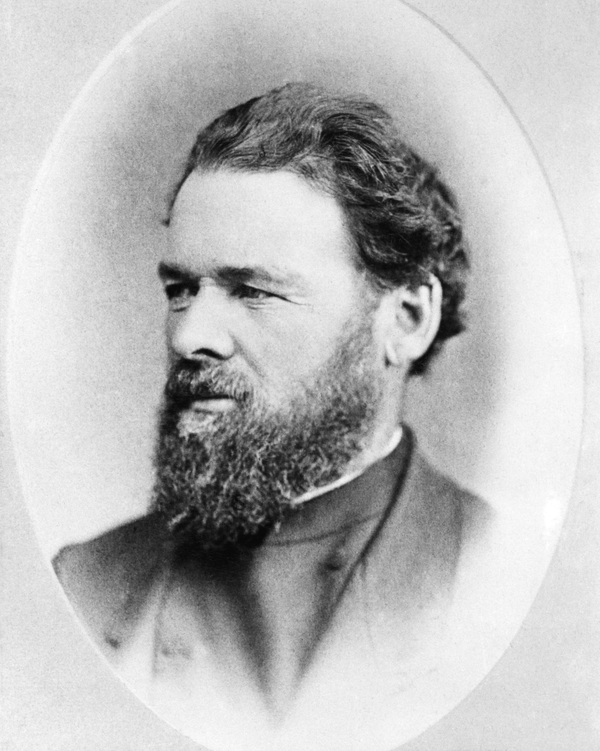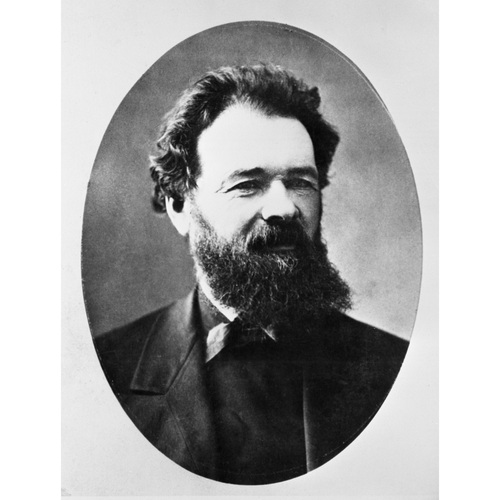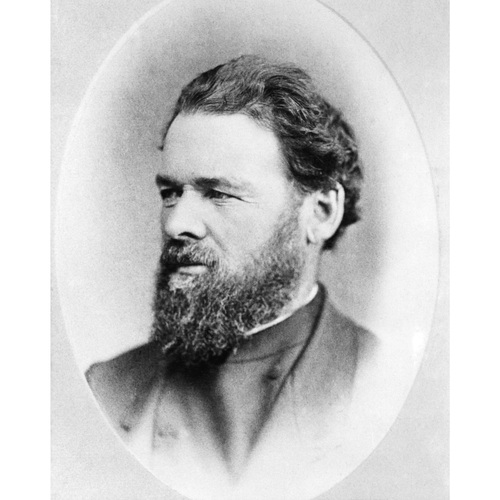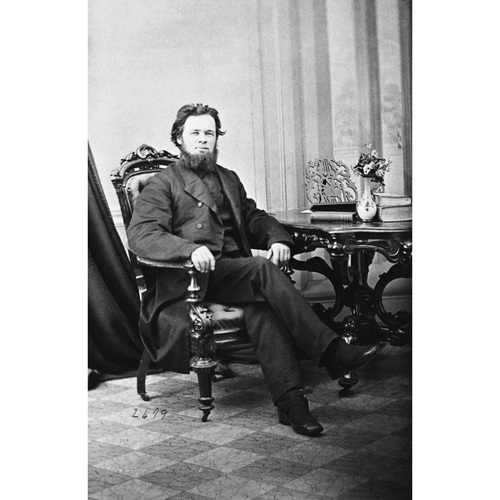
Source: Link
McDOUGALL, GEORGE MILLWARD, Methodist clergyman and missionary, b. 9 Sept. 1821 at Kingston, U.C.; d. 25 Jan. 1876 near Fort Calgary.
George Millward McDougall’s parents were Highland Scots. His father was stationed in Kingston as a non-commissioned officer in the Royal Navy during the War of 1812, and he himself, when a youth, served during the rebellion of 1837 in a militia unit, the Royal Foresters. Later he migrated with his parents to a farm near Barrie, Upper Canada. Though his elementary education was slight, he early learned the many pioneer skills needed in his future mission in the far west. On 10 Jan. 1842 he married Elizabeth Chantler, an English-born woman of Quaker parents. They had eight children, including Chantler*, who became his father’s assistant in missionary work, and David, a trader and rancher supplying the missions.
After religious conversion in meetings held by a Methodist lay preacher, Peter White, McDougall became a lay preacher also and offered himself for the ministry. He attended Victoria College, Cobourg, C.W., during the winter term of 1849–50, and then went to Alderville where he became assistant “on trial” to the veteran educator of Indians, the Reverend William Case*. McDougall’s early service as missionary was at Garden River and at Rama, near Orillia. He was ordained by the Methodist conference at Belleville, C.W., in June 1854.
In 1860 McDougall was appointed to the Rossville mission, near Norway House, HBC territory, and made chairman of the Methodist district extending from Oxford House and Rainy Lake (Lac La Pluie) to the Rocky Mountains. After visits to the missions in the Norway House area, he undertook an exploratory trip into the Saskatchewan valley in 1862. He conferred with fellow missionaries and with the Crees, and promised to become resident there the following year. In 1863 he and his family did indeed travel in HBC York boats up the Saskatchewan River, perhaps the first family in the vanguard of Ontario pioneers who settled in Alberta in the 1860s.
McDougall established a mission, Victoria (Pakan), on the North Saskatchewan River about 80 miles east of Edmonton House. His immediate task was to reinforce the religious work begun by the English Wesleyan missionary Robert Terrill Rundle* in 1840–48 and being continued by Henry Bird Steinhauer* and Thomas Woolsey, and to demonstrate to the Indians a way of life based on settlement and agriculture. On a fertile river bench, McDougall constructed the mission as the nucleus of a model pioneer settlement. Soon Indians and Métis (some of the latter from the Red River Settlement) took river lots on either side of the mission. With meagre equipment, seed grain and garden seeds were sown and agriculture taught, and homes and auxiliary buildings, a school and a church, were constructed. McDougall made numerous missionary journeys to his nomadic people in remote areas.
His son John was pressed into service to reopen a mission which they named Woodville, at the northwest end of Pigeon Lake. This mission was on an overland trail midway between Edmonton and Rocky Mountain Houses, accessible to both Stoney and Blackfoot tribes from the south.
The period from the transfer of the HBC territory in 1869 to the acquisition of the land by treaties with the Indians and the entry of the North-West Mounted Police in 1874, was one of distress and uncertainty in the North West. The buffalo migrated beyond the usual hunting ranges, crops failed, and game animals were visibly diminishing. The long-established authority of the HBC was set aside for a civil government previously unknown. The North-West Rebellion of 1869–70 made the procurement of food, goods, and mail service difficult for the missionaries. Then followed the smallpox epidemic of 1870. McDougall did his best with the remedies and medical knowledge he had. All his household were affected except his wife, and three of his daughters died. McDougall was appointed to a board of health, which reported that 3,512 persons died in the epidemic, approximately one-third of the native population. About this time McDougall built at the Victoria mission possibly the earliest hospital in present-day Alberta.
McDougall’s administrative duties had been made lighter in 1868, when a Red River District was established to the east, centring in Upper Fort Garry (Winnipeg), with its own chairman, the Reverend George Young*. McDougall’s western area was named the Saskatchewan District, and more missionaries were found to expand the work. Financial support then and later was largely supplied by the Missionary Society of the Wesleyan Methodist Church in Canada.
Because of the growing importance of Edmonton House as a transportation and trading centre, McDougall moved there to establish a permanent mission in 1871. He no doubt wished this mission to be a counterfoil to those of the Roman Catholics, by then well established at Lake Ste Anne and at St Albert under Father Albert Lacombe*, and at Edmonton with a church within the palisade. In 1873, authorized to begin a mission among the Blackfeet, McDougall and his son John located a site in the valley of the Bow River (Morley). This mission would be protected by the Mountain Stonies and within easy reach of the Blackfoot tribes on the prairies. Since the time of Rundle, the Stonies had remained staunch allies of the Wesleyans. The Blackfeet were the most intractable of the western tribes, and little missionary work had been done among them except when they had come to trade at the northern posts. McDougall appointed John to Morley as missionary in late October 1873, and his brother David went with him.
McDougall was involved in two pressing social problems, the illegal liquor traffic among the Indians [see Onistah-Sokaksin] and the demands of the Indian tribes for treaties with the Canadian government [see Wikaskokiseyin]. Feeling compassion for the many Indians, especially widows and orphans, made destitute by unrestrained tribal warfare, debauchery, and violence, often traceable to the rapacity of free traders, McDougall led the Indians to request the total prohibition of the sale of liquor in the territory. He voluntarily supported the new dominion government in persuading the native peoples to remain at peace and not to join the rebellious elements led by Louis Riel* in the Red River area. He was a “middleman” in communicating to the Indians the government’s intention to treat with them fairly; he also encouraged the Indians to address their own petitions to the government urging that their rights be settled by formal treaty.
When McDougall returned from furlough in 1875, he was requested by Alexander Morris*, lieutenant governor of Manitoba and the North-West Territories, to assure the western Indians that commissioners would be sent to negotiate treaties. McDougall undertook to visit every Indian camp from Carlton House (near present-day Prince Albert) west to the Rocky Mountains bearing this message and listening to the Indians’ addresses and requests. He carried this exacting assignment out satisfactorily, preparing the Indians for Treaties No. 6 and 7.
As the earliest Wesleyan clergyman to settle permanently on the prairies, McDougall advanced the cause of the Protestant church beyond the itinerancy of his predecessors. A man of his times, he was strongly sectarian in his church loyalties, but worked without stint to “christianize and civilize” his charges. His promotion of elementary education, agriculture, and health was outstanding, for the period and for the west. At his death he was planning a new mission station and an Indian orphanage on the Playground River (Oldman River). A strong stabilizing influence among the Indians and Métis, he was also a believer in confederation as a solution of the British North American problem and essentially nationalist in his sympathies. He warned church and state against separatist tendencies which he felt were supported by the Roman Catholic clergy, or which might be caused by the encroachments of the American free traders.
McDougall died of exertion while hunting buffalo. His body was found after a search and was buried in the Wesley Band cemetery (on the property of McDougall Memorial Church), near Morley. “Few men have passed away more deeply regretted by the Indian or white man, than this large hearted, courageous, laborious, and self-denying minister of Christ.”
Alberta Provincial Library, Journal of John Chantler McDougall, 1875–76. J. C. McDougall, George Millward McDougall, the pioneer, patriot and missionary (1st ed., Toronto, 1888; 2nd ed., 1902). Methodist Church of Canada, Missionary Society, Annual Report, 1875–76. Missionary notices of the Methodist Church of Canada (Toronto), 3rd ser., III (1875–78). Morris, Treaties of Canada with Indians, 168–276. Wesleyan Methodist Church in Canada, in connexion with the English conference, Missionary Society, Annual Reports (Toronto), 1865–74. Wesleyan Missionary Society notices, Canada conference (Toronto), I (1854–59); new ser., II (1868–74). John Maclean, Vanguards of Canada (Toronto, 1918), 119–38. J. E. Nix, Mission among the buffalo; the labours of the Reverends George M. and John C. McDougall in the Canadian Northwest, 1860–1876 (Toronto, [1960]).
Cite This Article
James Ernest Nix, “McDOUGALL, GEORGE MILLWARD,” in Dictionary of Canadian Biography, vol. 10, University of Toronto/Université Laval, 2003–, accessed December 29, 2025, https://www.biographi.ca/en/bio/mcdougall_george_millward_10E.html.
The citation above shows the format for footnotes and endnotes according to the Chicago manual of style (16th edition). Information to be used in other citation formats:
| Permalink: | https://www.biographi.ca/en/bio/mcdougall_george_millward_10E.html |
| Author of Article: | James Ernest Nix |
| Title of Article: | McDOUGALL, GEORGE MILLWARD |
| Publication Name: | Dictionary of Canadian Biography, vol. 10 |
| Publisher: | University of Toronto/Université Laval |
| Year of publication: | 1972 |
| Year of revision: | 1972 |
| Access Date: | December 29, 2025 |





